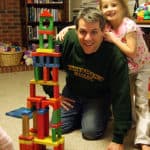I remember when my daughter Mikayla first answered that age-old question: “What do you want to be when you grow up?” She hadn’t quite grasped the traditional parameters of the exchange, how she was to respond with a specific dream that would point her toward the sort of bright, shining future that every parent wants for his or her child.
I want to be an astronaut. An actress! A fighter pilot!
Instead, Mikayla, who was maybe 7 at the time, responded with a colorful, complex mixture of seemingly unrelated ambitions: “I want to be an artist and an explorer, and a basketball player and good singer like Mommy. I want to be a rancher like Aunt Jaime and have pet snakes like Uncle Jeremy. I want to …”
And on it went, a heaping plateful of selections taken from her thus far limited experience at the buffet of life. While most of her ambitions seemed relatively down to earth, I noticed that it was a rather long list. She didn’t see why anyone couldn’t be a rancher and a runner, a singer and a snake owner. She didn’t see why she had to pick just one thing to be.
What do you want to be when you grow up?
Why do we ask our kids that question? Harmless fun, sure, but it is kind of a strange question, or at least a very narrow one. Can a young child really understand the awesome spectrum of paths and possibilities that life in this world offers?
There are thousands of factors that may affect a child’s future. Dreams change, for one thing, usually gravitating toward a child’s developing strengths and abilities, unique personality, even genetic traits. And life itself has a way of narrowing options. Competition builds. Children make choices that have consequences — or they are affected by others’ choices. Some doors slam shut, while others swing wide open. And parents add decisions to the mix, as well. It’s part of our job, really, to help kids weigh possibilities against practicalities.
With the future so full of unforeseeable possibilities, we shouldn’t let our children get overly focused on specific goals. Instead, we can focus on the fundamental character qualities they must develop to help them be successful on whatever path they find themselves on. At some point, our kids will be out there, on their own, chasing their ambitions. And, as parents, we can do little more than equip them for this adventure.
Are you raising a future doctor, or a good worker who sees the value of education and wants to help people who are hurting? A concert pianist, or a person who can tackle something new and stick with the practice even when it becomes difficult? A professional athlete, or a healthy, well-adjusted adult who understands the dedication it takes to always do your best, even when no one is watching?
5 Traits of a Dream Chaser
As parents, we help our children develop goals and attain them through helping them work hard in school and at their different activities. And it’s even fine to label specific ambitions. Children should aim for something. But there are no guarantees, and our job as parents isn’t so much to help our children realize their goals as it is to help them build the traits needed to pursue a goal, and recover and refocus when that first plan doesn’t work out.
Here are five traits that every dream chaser needs:
Perseverance
You can teach this quality to your children in little ways. Have them practice a skill every day or press on to finish a difficult school assignment. By doing this, you help your child recognize that success is almost always built on smaller steps that are done on a consistent basis.
Resilience
The road to any dream is strewn with times of failure. And while failure sometimes necessitates a change of plans, it often indicates that it’s simply time to get back up and try again. Remind your kids that the journey isn’t over. There is always another test, another recital, another ball game, another chance to choose kindness or say the right thing.
Responsibility
Flipping burgers, bussing dishes and raking and mowing lawns aren’t jobs beneath anyone’s self-respect. Help your kids see how skills and ambition can be developed as they begin taking responsibility for whatever task they have at hand. Asking children to complete their ongoing chores well and efficiently is good training.
Vision for the next step
Goal-setting teaches kids to aim for a specific outcome and to measure their time, talents and resources against a target. Practice this skill by setting monthly or yearly goals for your children’s progress in school or in different activities. Teach them to develop a plan — breaking the big goal down into small chunks to work at every day.
A team player
The ability to work with others, for the good of the team as a whole, is an important skill to instill in children. Help your kids learn how to cooperate with others and see the value of friendships in achieving goals and dreams. “Friendship is the best investment,” says Pastor Ray Johnston, author of The Hope Quotient. “Friendships provide encouragement, support during tough times and healthy accountability. . . . God didn’t design us to win alone.”
Balancing dreams with reality
In addition to encouraging these traits and skills, parents have one more essential task to help their children become successful dream chasers. We must aim to raise children who truly know themselves “and can live honestly from that knowledge,” says Vicki Caruana, author of Giving Your Child the Excellence Edge.
Vicki tells the story of her son Charlie’s first weeks in fifth grade. His teacher had moved his desk up next to hers because he was always talking with friends during instruction time. The new location improved his behavior, so after a few days, his teacher gave him the opportunity to sit with his friends again. To his teacher’s (and mom’s) amazement, Charlie said that since he was so easily distracted, he probably should stay put. “I’ll work much better alone,” he said.
As a fifth-grader, Charlie had already demonstrated a remarkable trait: The ability to evaluate life and adapt to it in light of his strengths and weaknesses. It’s an essential skill for people who are able to pursue their dreams. And it’s a trait that we can help our kids develop, Vicki says. One of the constant goals of parents should be “to help kids discover the things that are both helping and hindering their progress,” she says.
Recognizing a path to the future
As our kids face various challenges and opportunities, we can help them practice assessing each situation by considering their individual learning styles, natural abilities and personality traits. We can help them consider how strengths and resources can be capitalized on and how weaknesses can be minimized. This ongoing process of reflection helps kids chart a clearer path toward their future. They can learn how to identify and avoid major obstacles and determine how to overcome the rest.
And as kids get older and begin to fine-tune their dreams, this ability to keep an honest eye on reality becomes one of their greatest assets in understanding who they are, where they are going and how they might get there.
























